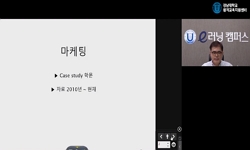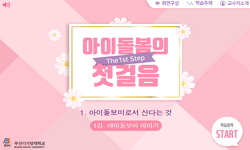Purpose: This study aims to offer fundamental data to develop a career program that helps the dental technology students find a proper and desired job position and to be satisfied with their job. To this goal, we analysed the differences found between...
http://chineseinput.net/에서 pinyin(병음)방식으로 중국어를 변환할 수 있습니다.
변환된 중국어를 복사하여 사용하시면 됩니다.
- 中文 을 입력하시려면 zhongwen을 입력하시고 space를누르시면됩니다.
- 北京 을 입력하시려면 beijing을 입력하시고 space를 누르시면 됩니다.
https://www.riss.kr/link?id=A102040982
- 저자
- 발행기관
- 학술지명
- 권호사항
-
발행연도
2016
-
작성언어
Korean
- 주제어
-
등재정보
KCI등재
-
자료형태
학술저널
-
수록면
87-98(12쪽)
-
KCI 피인용횟수
1
- 제공처
-
0
상세조회 -
0
다운로드
부가정보
다국어 초록 (Multilingual Abstract)
Purpose: This study aims to offer fundamental data to develop a career program that helps the dental technology students find a proper and desired job position and to be satisfied with their job. To this goal, we analysed the differences found between the personality type, major satisfaction, job satisfaction, and preference in job position among the dental technology students. Method: We conducted a survey using Myers-Briggs Type Indicator among the subjects who are sophomores and juniors of the dental technology department of a university in Gangwon province. Our analysis was grounded on 130 valid questionnaires. Results: The results are summarized as follows: In personality type ESTJ turned out the highest as 20.0%, while ENTP was the lowest as 0.8%. The preference was revealed as Extraversion (66.9%), Sensing (74.6%), Feeling (50.8%), Judging (61.5%) respectively. Of the general characteristics, only the religious or non-religious state was statistically meaningful as (p<. 05) in emotional type (F). No statistical significance was found in the major satisfaction. The job satisfaction was statistically meaningful as p<. 05 in Judgemental type (J). GPA was statistically significant as p<. 05 in the sensory type of the personality type. Desired job position was statistically meaningful as p<. 05 in emotional and cognitive types. Conclusion: We found a meaningful difference in the job satisfaction and the desired job position with respect to the personality type of dental technology students. However clear explanation of the correlations among these factors requires a more comprehensive survey and various approaches from the personality and psychology tests, which is to follow.
목차 (Table of Contents)
- [Abstract]
- Ⅰ. 서론
- Ⅱ. 연구 방법
- 1. 연구 대상 및 방법
- 2. 연구도구
- [Abstract]
- Ⅰ. 서론
- Ⅱ. 연구 방법
- 1. 연구 대상 및 방법
- 2. 연구도구
- 3. 분석방법
- Ⅲ. 결과
- 1. 일반적 특성
- 2. MBTI에 따른 성격 유형 및 선호 경향
- 3. 일반적 특성과 성격유형
- 4. 성격유형 간의 상관관계
- Ⅳ. 고찰
- Ⅴ. 결론
- REFERENCES
참고문헌 (Reference)
1 김민진, "치의학전문대학원생의 MBTI 유형과 PBL 학업성취도와의 관계" 한국의학교육학회 26 (26): 291-297, 2014
2 이영희, "치과대학생의 성격유형과 학업성취도의 관계" 한국인간발달학회 16 (16): 179-196, 2009
3 한애경, "임상간호사의 성격유형에 따른 직무스트레스와 대응방법에 관한 연구" 병원간호사회 13 (13): 125-136, 2007
4 박재용, "성격유형과 학습성취도의 관계에 관한 실증연구" 한국인사관리학회 29 (29): 99-123, 2005
5 임승환, "대학생 내담자의 MBTI 성격유형과 MMPI 척도에서 나타난 임상적 특징" 한국청소년상담복지개발원 16 (16): 91-104, 2008
6 김은주, "간호사의 MBTI 성격유형과 학습조직화와의 관계" 간호행정학회 11 (11): 265-273, 2005
7 장현정, "간호대학생의 MBTI 성격유형별 기질과 학습유형 및 학습전략" 한국콘텐츠학회 14 (14): 400-410, 2014
8 "http://www.mbti.co.kr/"
9 Lee KB, "The study of emotional experience to MBTI personality type in university students" 2 (2): 188-194, 2014
10 Park SH, "The relevance of MBTI personality types to mathematics preference and academic achievement" Kookmin university 2005
1 김민진, "치의학전문대학원생의 MBTI 유형과 PBL 학업성취도와의 관계" 한국의학교육학회 26 (26): 291-297, 2014
2 이영희, "치과대학생의 성격유형과 학업성취도의 관계" 한국인간발달학회 16 (16): 179-196, 2009
3 한애경, "임상간호사의 성격유형에 따른 직무스트레스와 대응방법에 관한 연구" 병원간호사회 13 (13): 125-136, 2007
4 박재용, "성격유형과 학습성취도의 관계에 관한 실증연구" 한국인사관리학회 29 (29): 99-123, 2005
5 임승환, "대학생 내담자의 MBTI 성격유형과 MMPI 척도에서 나타난 임상적 특징" 한국청소년상담복지개발원 16 (16): 91-104, 2008
6 김은주, "간호사의 MBTI 성격유형과 학습조직화와의 관계" 간호행정학회 11 (11): 265-273, 2005
7 장현정, "간호대학생의 MBTI 성격유형별 기질과 학습유형 및 학습전략" 한국콘텐츠학회 14 (14): 400-410, 2014
8 "http://www.mbti.co.kr/"
9 Lee KB, "The study of emotional experience to MBTI personality type in university students" 2 (2): 188-194, 2014
10 Park SH, "The relevance of MBTI personality types to mathematics preference and academic achievement" Kookmin university 2005
11 Yoon HK, "The relations among MBTI preferences, study types and learning strategies" Kookmin university 2012
12 Kim HS, "The effects of achievement goal orientation and self-efficacy on course interests and academic achievement in medical students" 12 (12): 385-393, 2003
13 Jung MJ, "The components of love and the types of love according to the MBTI personality types" 5 (5): 35-54, 2003
14 Oh YK, "The characteristics of the Myers-Briggs type indicator in premedical students" 32 (32): 19-27, 2007
15 Kim RH, "The analysis on how MBTI personality type can influence on the job stress and coping method of care helpers" Sahmyook university 2011
16 Hong CS, "Research on the level of academic achievement by the MBTI type of personality of the middle and high school student" Kangwon national university 2009
17 Kim HJ, "Relationship of personality type to stresscoping pattern and school adjustment among high school students" Konkuk university 2010
18 Kim SY, "Relationship between personality type on MBTI and adolescent’s school adjustment" Sookmyung women’s university 1999
19 Han EK, "Relationship among the MBTI personality types and academic achievements according to gender of university students" 14 (14): 149-172, 2007
20 Kim JK, "Organization members‘ personality pattern and organizational effectiveness" Kwangwoon university 2006
21 Park SJ, "Effects of the differentiated method based on the type of MBTI personality on the learning of mathematics" Dongguk university 2014
22 Choi MY, "Analysis of cosmetology-majored students’personality types and ability to perform studies" Konkuk university 2011
23 Kang MJ, "An study on the relationship among MBTI personality types, job satisfaction, customer orientation and turnover intention" Ulsan university 2014
24 Park JO, "An empirical study on the effects of working condition and personality type on organizational effectiveness" Incheon national university 2013
25 Park JS, "An analysis of the difference of the technical high school students’stress coping behavior in MBTI personality type" Konkuk university 2002
동일학술지(권/호) 다른 논문
-
치과 도재용착용 Ni-Cr 합금의 열처리에 따른 결합력 연구
- 대한치과기공학회
- 주규지
- 2016
- KCI등재
-
전기화학적 방법에 의한 타이타늄 분극특성 및 나노메쉬 형성
- 대한치과기공학회
- 박진서
- 2016
- KCI등재
-
2종류의 버와 3종류의 버를 이용해 제작된 크라운 보철물의 정밀도 평가
- 대한치과기공학회
- 김총명
- 2016
- KCI등재
-
5축 밀링으로 가공한 PMMA 3본 브릿지의 내면 적합도 평가
- 대한치과기공학회
- 김총명
- 2016
- KCI등재
분석정보
인용정보 인용지수 설명보기
학술지 이력
| 연월일 | 이력구분 | 이력상세 | 등재구분 |
|---|---|---|---|
| 2027 | 평가예정 | 재인증평가 신청대상 (재인증) | |
| 2021-01-01 | 평가 | 등재학술지 유지 (재인증) |  |
| 2020-07-01 | 학술지명변경 | 외국어명 : THE JOURNAL OF KOREAN ACADEMY OF DENTAL TECHNOLOGY -> Journal of Technologic Dentistry |  |
| 2018-01-01 | 평가 | 등재학술지 선정 (계속평가) |  |
| 2017-01-01 | 평가 | 등재후보학술지 유지 (계속평가) |  |
| 2015-01-01 | 평가 | 등재후보학술지 선정 (신규평가) |  |
| 2013-12-01 | 평가 | 등재후보 탈락 (등재후보2차) | |
| 2012-01-01 | 평가 | 등재후보 1차 FAIL (기타) |  |
| 2010-01-01 | 평가 | 등재후보학술지 선정 (신규평가) |  |
학술지 인용정보
| 기준연도 | WOS-KCI 통합IF(2년) | KCIF(2년) | KCIF(3년) |
|---|---|---|---|
| 2016 | 0.13 | 0.13 | 0.14 |
| KCIF(4년) | KCIF(5년) | 중심성지수(3년) | 즉시성지수 |
| 0.19 | 0.23 | 0.285 | 0.03 |




 eArticle
eArticle






